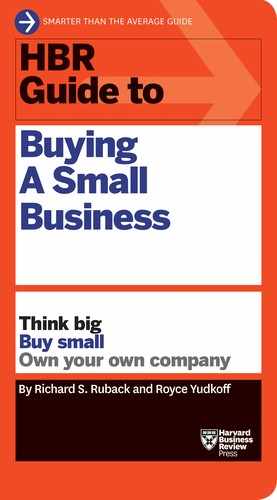CHAPTER 21
The Closing Day and Beyond
The actual closing of your acquisition will be anticlimactic. The various documents are gradually assembled and reviewed by buyer’s and seller’s attorneys, and signature pages emailed to one of the lawyers, who holds them in escrow. Once all the pages have been collected, the wire transfers are released and you become the owner of your own firm. Congratulations!
There are a few things to keep in mind as you make the transition to ownership. And while each company will have different priorities, there are four essential tasks you should focus on right after your closing.
First, you want to introduce yourself to all your managers and employees and reassure them that they aren’t going to see any immediate changes. All of them will be wondering what your new ownership means for them. And if they are spending too much time wondering, they won’t be productive. This is also an opportunity to speak about your goals for the company at a general level, whatever they are: excellent service to customers, commitment to quality, new ways to grow the business, a satisfying work environment. It is also an opportunity for the staff to ask you questions and begin to build confidence in you. But don’t be too specific in your plans or promises yet. You don’t yet know enough about the company, and people will respect your professional maturity if you say, “I want to take some time to learn before I make a decision about that.”
Second, if you have a transition arrangement with the former owner, you want to be clear both with employees and with customers how the transition will work. Your employees have developed the habit of going to the former owner with their questions and requests for approval, and they will need specific guidance on how decisions are now made. There is no one correct division of roles, but talk over the plan with the former owner, and then make a clear statement such as: “I’m delighted that Ms. Smith has agreed to a six-month transition. I will be taking over the business as of today and running it, but she will be around here as my valued advisor.” Or: “Mr. Jones will continue to oversee sales and customer service while I learn that part of the business; you can come to me on any financial or production matters.” The goal of these communications is to eliminate confusion over who does what after the sale and to keep everyone focused on their work.
Third, take control of the cash. The most common reason smaller firms run into trouble is that they run out of cash. The prior owner probably ran the business largely debt-free, but you will be running the same business with acquisition debt to service. To track your cash flow, set up a process whereby you approve all payments before they go out, and review your accounts-receivable balances at least weekly. Finally, you should implement a 90-day rolling cash flow forecast: Every month, you forecast cash receipts and expenditures for the upcoming three months. This practice will help you avoid cash crises by identifying early when cash will get tight so you can take actions like redoubling collections efforts, slowing payment of accounts payable, or even arranging a line of credit at a bank.
Fourth, go meet your clients. They will like meeting the boss, and you will get plenty of ideas about how to improve service and how to sell additional products. When business partners Patrick Dickinson and Michael Weiner bought Castronics, the pipe threading company in Nebraska, they interviewed every major customer. Patrick later commented: “Every single one of our new product and service ideas came from these interviews. We didn’t implement every idea the customers suggested, but every idea we did implement originated in this set of interviews.”
Finally, don’t rush into making big decisions in the first few months. Most of these can wait. Notwithstanding your thorough due diligence, you still have much to learn about running your new company, and you will make better decisions with a few months’ experience under your belt. At the same time, don’t be paralyzed—you’ll still need to make numerous little decisions every day. Most will be right; some will be wrong. When you figure out the wrong ones, you can go back and fix them. That’s part of the beauty of being your own boss.
The weeks after closing will be exciting, busy, and filled with learning. You will be fully engaged and pulled in more directions than even an extended business day can accommodate. Don’t worry; it will all settle down. If you’ve come this far, you are smart, energetic, and well equipped to handle the learning curve.
